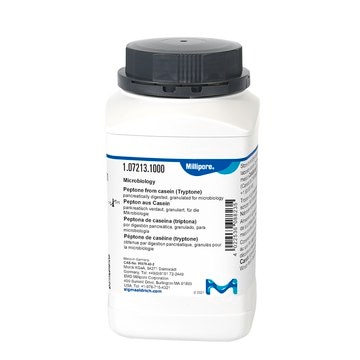T9410
Casein Peptone
Enzymatic digest of casein from bovine milk, 11.4-13.9% total nitrogen, suitable for biotechnology and microbiology
Sinónimos:
Peptone from casein, Peptone from casein, casein tryptic digested, Tryptone
About This Item
Productos recomendados
product name
Tryptone, Pancreatic digest of casein, Suitable for microbiology
biological source
bovine milk
Quality Level
form
powder
packaging
poly bottle of 1 kg
poly bottle of 250 g
nitrogen analysis
11.4-13.9% total
loss
≤11% loss on drying
pH
6.6-7.4
application(s)
microbiology
¿Está buscando productos similares? Visita Guía de comparación de productos
General description
Application
Storage Class
11 - Combustible Solids
wgk_germany
WGK 1
flash_point_f
Not applicable
flash_point_c
Not applicable
ppe
Eyeshields, Gloves, type N95 (US)
Elija entre una de las versiones más recientes:
Certificados de análisis (COA)
¿No ve la versión correcta?
Si necesita una versión concreta, puede buscar un certificado específico por el número de lote.
¿Ya tiene este producto?
Encuentre la documentación para los productos que ha comprado recientemente en la Biblioteca de documentos.
Los clientes también vieron
Nuestro equipo de científicos tiene experiencia en todas las áreas de investigación: Ciencias de la vida, Ciencia de los materiales, Síntesis química, Cromatografía, Analítica y muchas otras.
Póngase en contacto con el Servicio técnico












